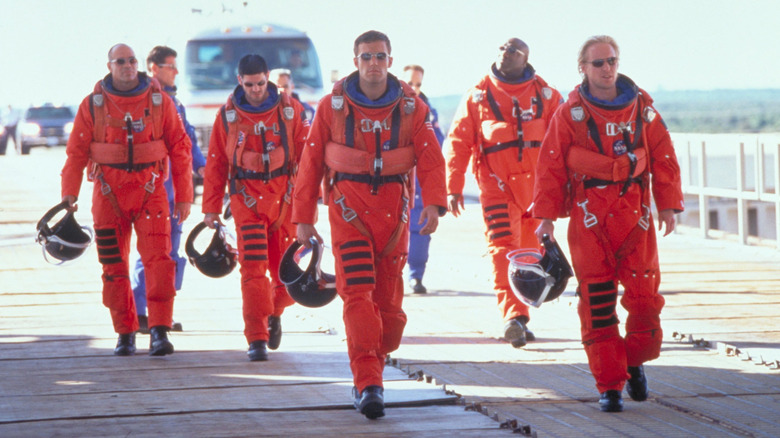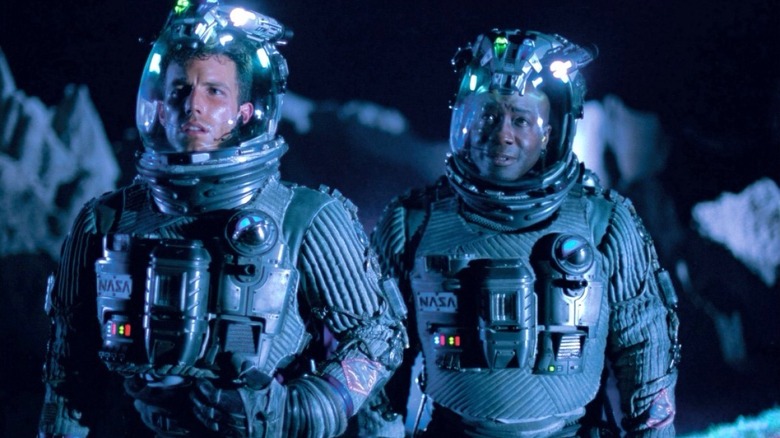
Who among us hasn't tried to take credit -- even with tongue firmly planted in cheek -- for multi-million dollar space ventures created in the pursuit of scientific knowledge and planetary defense? I can't speak for everyone, but that's pretty much a normal weekday for me. It probably won't come as much of a surprise to most that none other than blockbuster filmmaker Michael Bay would be the first to draw some rather interesting parallels between a currently ongoing NASA mission with incredible ramifications on the future of humanity's collective existence ... and the 1998 disasterpiece known as "Armageddon." Honestly, on some level, I have no choice but to respect Bay's hustle here.
As it turns out, all the haters and losers who laughed off the absurd premise of oil drillers training to become astronauts in the span of a fortnight so they can travel to an incoming asteroid, blow it in half with a nuclear bomb, and save the planet were actually wrong! Over two decades later, Bay is finally having the last laugh. Kind of. You know what, we'd better unpack this a bit more.
The Armageddon Effect?

Let's set the stage. In 1998, Michael Bay unleashed "Armageddon" onto an innocent and unsuspecting world. After enduring two and a half hours of physics-defying (some might say physics-insulting) antics, Aerosmith needle drops, and general testosterone-infused Bayhem, audiences walked out in a dazed mass and nothing was ever the same again. If Bay gets his way, however, the legacy of "Armageddon" would also have ramifications as far-reaching as a 2021 NASA mission that has been decades in the making.
That's where DART comes in, which stands for "Double Asteroid Redirection Test." To be fair, the mission has some (very superficial) similarities to "Armageddon." Having launched last week on November 23, the idea of the mission is to send an unmanned craft, roughly the size of a car, on a collision course to an asteroid named Dimorphos -- which, importantly, poses no threat whatsoever to Earth. The goal is to smash the probe into the planetary body and see if the high-speed kinetic impact alters the orbit of the asteroid in any measurable way. This will provide scientists with invaluable data to determine if this could ever actually be a viable option should a deadly asteroid, comet, or any other cosmic killjoy end up putting our planet in its crosshairs in the future. Since setting off nuclear explosions in space is kind of frowned-upon, this would be the next best thing.
According to The Wrap, Bay said what everyone who's ever watched "Armageddon" was thinking and claimed that, "Our plan was not far off." Thankfully, he also recognized the obvious differences between the two.
"[NASA is] not sending in an oil-drilling team, but our plan was not far off where they send a craft to nudge it, either with a nuke or whatever, they just have to nudge it. They had a bunch of stuff we mentioned in the movie that were real plans that are on the table.
It just makes the world aware that there is a big effing problem that we might have one day so it's better to get our asses in gear now and practice for what can be a very serious situation. It's great that they're trying something."
In all seriousness, this is a neat instance of reality (somewhat) following fiction. We'll have to wait 11 months until the spacecraft impact actually takes place, but you won't want to miss a thing.
Read this next: Top 15 Best Natural Disaster Movies
The post Michael Bay Says Armageddon Was 'Not Far Off' From NASA Asteroid Mission appeared first on /Film.
from /Film https://ift.tt/3D5azs3
via IFTTT
Comments
Post a Comment